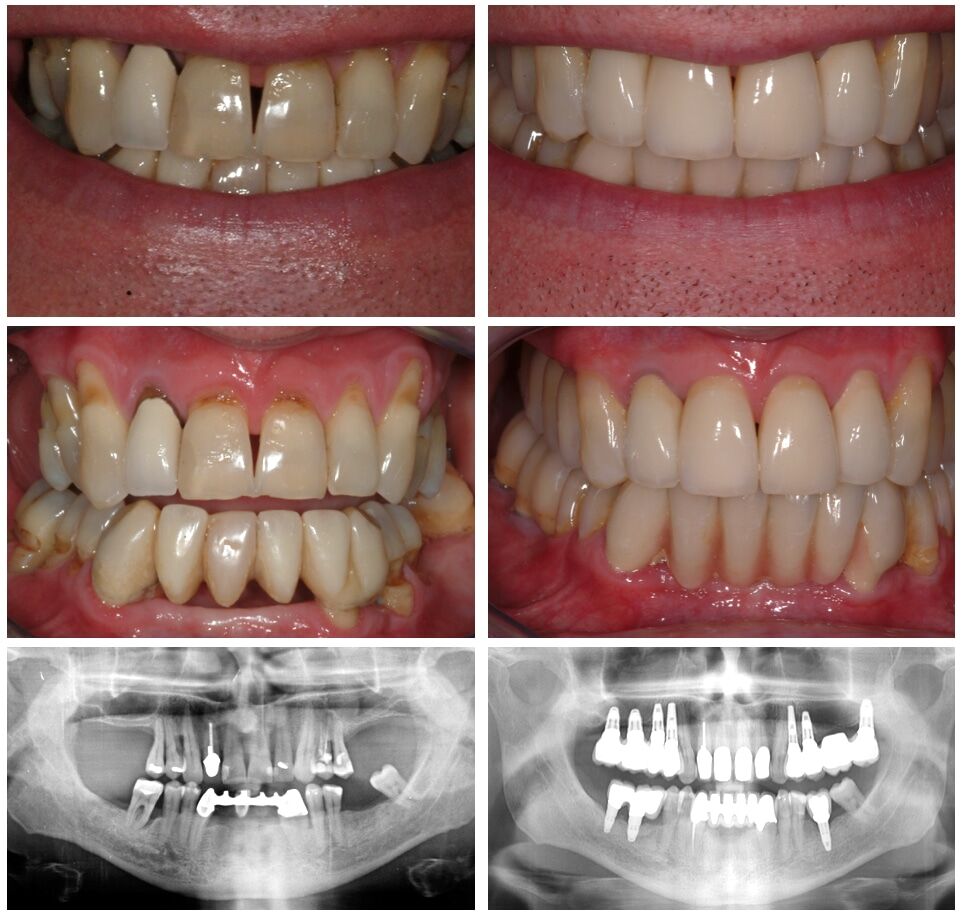Dental bridges are a fixed replacement for a missing tooth or teeth. A dental bridge can be secured to one or more of the teeth next to the missing tooth or teeth, using one of a number of methods including:
- crowns on a supporting tooth or teeth,
- adhesive wings (i.e. for resin bonded bridges), or
- by screws or abutments for bridges on implants.
Dental bridges are usually made of high strength dental ceramics or dental ceramics fused to a metal substructure.
Fixed bridges on either teeth or implants provide excellent durability and aesthetics, but their success is also dependant on the overall condition of your mouth and other teeth, on good home dental care and professional maintenance.

Are dental bridges permanent?
The short answer to this question is no – no dental work is permanent. However, they are a long-lasting solution to missing teeth.
Typically, we would expect fixed bridges to last anything from 10-30 years depending on the condition and health of the teeth and rest of the mouth, as well as on the quality of the patient’s oral hygiene and long-term maintenance. Here at the Windsor Centre for Advanced Dentistry, our longest lasting bridges have endured more than 30 years!
If dental bridgework is carried out by a professional with the expertise and skills needed to perform the treatment to the highest quality, such as our dentists at the Windsor Centre for Advanced Dentistry, there is a much higher chance of success and longevity.
According to a study on long-term restoration survival, one of the most crucial factors for success is the dental practice, the experience and skill level of the dentist and the attention to detail. This is what we call the centre-effect; the success and quality of a dental bridge is dependent on the individual skill and expertise of the dentist who carries out the work. This is borne out by numerous studies in dentistry on success and outcomes of treatments. As we mentioned before, all our dentists at WCAD are of the highest level of quality and expertise so, as the centre-effect suggests, a dental bridge fitted here will be of the highest quality.
To support the dental work, patients also need to have a healthy mouth, will need to regularly attend maintenance and hygiene appointments, and keep good oral hygiene habits.
How often do dental bridges need to be replaced?
We would normally expect bridgework to last around 10-25 years before it needs revising, repairing or replacing. It’s always possible to chip a bridge in the same way that you can accidently chip a tooth, and wear and tear differs for each person, depending on their bite force, dietary habits, oral and general health, the overall condition of the teeth and gums, and the quality of the oral hygiene and maintenance care.
Patients should also avoid using teeth and bridgework for ‘para-functional’ purposes such as nail biting, chewing pens, or using teeth as tools, i.e. cutting thread or Sellotape for example. These habits can lead to excessive forces being applied to edges of the teeth and dental ceramics, which may lead to fracture or chipping. So, the length of time you have your bridge may be different to someone else even if they were fitted around the same time.
There are different types of fixed bridgework or dental bridges – each has different indications and it’s best to ask the dentist which would be best for you.
According to numerous studies, there are a number of factors that most influence the survival and longevity of dental restoration. These include:
- The ‘centre effect’ as discussed above
- The expertise, experience and attention to detail by the dentist and dental technician performing the treatment and the restoration
- The condition of the teeth supporting the bridge and the general dental condition and oral hygiene
- The patient’s age when the restorations were placed
- The frequency of attendance for treatment and the level of maintenance care
- The restoration placement type, i.e. whether and initial or replacement restoration
At the Windsor Centre for Advanced Dentistry, we pride ourselves on our dedication to providing the best quality dental bridges, and we make sure you have a consistent relationship with your dentist throughout the procedure.
How many teeth can be put on a bridge?
The number of teeth that can be put on a bridge is dependent on a number of things:
- the individual patient, the number of missing teeth and the overall condition of the supporting and other teeth and gums,
- the bite force (e.g. light or heavy),
- the position and angulation of the teeth, and
- a few other details best evaluated by the dentist.
Generally, the maximum number of missing teeth that can be bridged between two abutments (supporting teeth or implants) is four, but this will be influenced by factors already mentioned. A bridge can also be more extensive and restore multiple gaps between more than two teeth or implants. Full arch bridgework can also be used for multiple gaps supported on four to eight teeth or implants.
Since conventional bridgework is usually implemented between one tooth and another, the dentist will analyse a patient’s individual situation and advise the best approach. Of course, implants can also be placed to provide additional support to bridgework or instead of bridgework if required. Whether you need a new dental bridge, or need to rectify failing dental bridgework, we’re happy to help. With over 30 years of experience among our dentists, we can provide you with the best long-term life-changing restorative dentistry to give you back your smile.